
Warning: This story contains details that can be upsetting to readers
The La Ronge area made history this July when Canada Day festivities were cancelled in order to focus on reconciliation. On September 30 the community celebrated Canada’s first National Day for Truth and Reconciliation. The following day crews continued the difficult work of uncovering unmarked graves.
“Those schools were set up to kill the Indian in the child,” Chief Tammy Cook-Searson said.
“The children spoke, and they woke us up. We have to do something and we have to work together. We have to find that common way forward. The First Nations are underfunded, whether it’s child welfare, education, or health. We have to change the attitudes of the past.”
Cook-Searson led prayers in the morning and a procession made its way along highway 102 to the site of the former All Saints Indian Residential School in La Ronge. Traditional healers and healthcare workers were there to offer support as work resumed the next day to identify unmarked graves.
Volunteers cooked three meals a day that included wild game and other options. Visitors to the site could learn about the history from local historians John Irving and Teron Roberts.
Following a traditional pipe-ceremony, Bishop Michael Hawkins, who heads the Anglican Diocese of Saskatchewan, joined in prayers with survivors.
He apologized for the role that his church played in the residential school system.
“I was there to pray with people and to pray around the cemetery as well, which has been wonderfully restored, and I’m glad for that. And to honour that place not only because of the school but for the generations before that are there,” Hawkins said.
“I was able to extend an apology on behalf of the whole Anglican Church of Canada for our part in the legacy of the residential schools. In particular, for our complicity in the government program of assimilation of which the schools were a part.”
Hawkins called it “providential” that the ground penetrating work happened when it did.
“From my point of view as the Bishop, that day was just the beginning. It’s another small beginning. But this is a long journey towards reconciliation. It’s a commitment to walk together on that journey, with its twists and turns, and with all its ups and downs,” Hawkins said.
“That the event was held the day after the first National Day for Truth and Reconciliation is a sign that this isn’t over. It’s just beginning for us as a country, and especially for us, as the Anglican Church of Canada.”
Cook-Searson said it was important to have Hawkins there alongside traditional healers and elders because of the role the Anglican Church still plays in the lives of Indigenous people here.
“That was really powerful because many of us still practice the Anglican faith,” Cook-Searson said.
“Most of our funerals, our services, baptisms and weddings are within the Anglican Church.”
She said the work will take time and needs to be done properly with respect for what people are going through. She said involving the Anglican Church and RCMP, that both played a part in the residential school system, is part of healing and moving forward.
“We have to be able to build on that relationship that has been broken. There are so many issues that we have to work on but we also have a lot of strengths and those are the strengths that we have to build on,” Cook-Searson said.
“There are so many things to celebrate and we have to do it inclusively. It’s something that we work on as a whole community. We still have so much work to do in coming together, having a common understanding, supporting each other and being compassionate.”
A national 24-hour Indian Residential School Crisis Line is available to support survivors and those affected. You can access emotional and crisis support referral services by calling 1-866-925-4419.
